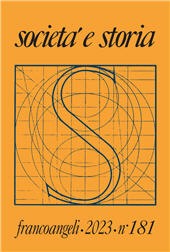"Studiate la storia" : N.G. Černysevskij vs Herzen : il discorso sull'Asia
458-474 p.
Nel fuoco della controversia sulla liberazione dei contadini servi in Russia, Nikolaj Gavrilovič Černysevskij alla metà del 1861 riaprì, dalle pagine della sua rivista, il "Sovremennik" (Il contemporaneo), la polemica con Aleksandr Ivanovič Herzen. Ne condannava la sfiducia nei confronti dell'Occidente e la speranza da lui riposta nella mis-ÂÂ sione salvifica della Russia. Gli storici collocano questa disputa nell'ambito della discussione sulla realizzazione del socialismo e sulla possibilità che fossero proprio i Russi a imporlo in Europa. Ma se, in questa discussione, si rivolge l'attenzione alla critica di Černysevskij dell'idea, sostenuta da Herzen, che i popoli occidentali, di ceppo latino e germanico, avessero esaurito la loro forza e che il compito di adempiere a quella che prima era stata la loro funzione civilizzatrice spettasse al popolo russo in virtù della freschezza e dell'energia che scaturivano dalla sua matrice barbara e asiatica, il quadro che ne emerge si arricchisce e si complica.
Nel saggio l'autore propone di guardare a questa disputa non tanto come a una semplice denuncia dell'influenza dell'ideologia slavofila, quanto come a un drammatico conflitto tra modelli di sviluppo e stili di vita che investì implicitamente la totalità degli assetti sociali dell'impero, nel tentativo di neutralizzare la carica messianica insita nell'idea di una proiezione universale della Russia. [Testo dell'editore].
During the heat of the debate over the liberation of the serf peasants in Russia, Nikolaj Gavrilovich Černysevskij reopened, in mid-ÂÂ1861, from the pages of his magazine "Sovremennik" (The Contemporary), the controversy with Aleksandr Ivanovich Herzen. Černysevskij condemned Herzen's distrust of the West and the hope he placed in Rus sia's saving mission. Historians place this dispute in the context of the discussion re-ÂÂ garding the realization of socialism and the possibility that it was precisely the Rus sians who imposed it in Europe.
The whole picture that emerges is enriched and com plicated if the focus shifts to Chernyshevsky's critique of the idea, supported by Her zen, that, on the one hand, the Western peoples of Latin and Germanic stock had exhausted their strength and, on the other, that the task of fulfilling what was formerly their civilizing function now belonged to the Russian people by virtue of the freshness and energy that sprang from their barbarian and Asian matrix. In the essay, the author proposes to consider this dispute not so much as a simple denunciation of the influen ce of Slavophile ideology, but as a dramatic conflict between models of development and lifestyles which implicitly invested the totality of the social structures of the empi re, in an attempt to neutralize the messianic charge inherent in the idea of a universal projection of Russia. [Publisher's text].
Fa parte di
Società e storia : 181, 3, 2023-
Articoli dello stesso fascicolo (disponibili singolarmente)
-
Informazioni
Codice DOI: 10.3280/SS2023-181003
ISSN: 1972-5515
MATERIE
PAROLE CHIAVE
- Černyševskij, Herzen, intelligencija, decadenza dell'Occidente, missio-ÂÂ ne salvifica della Russia, modelli di sviluppo
- Černysevskij, Herzen, intelligencija, Western decadence, Russia's saving mission, development models


